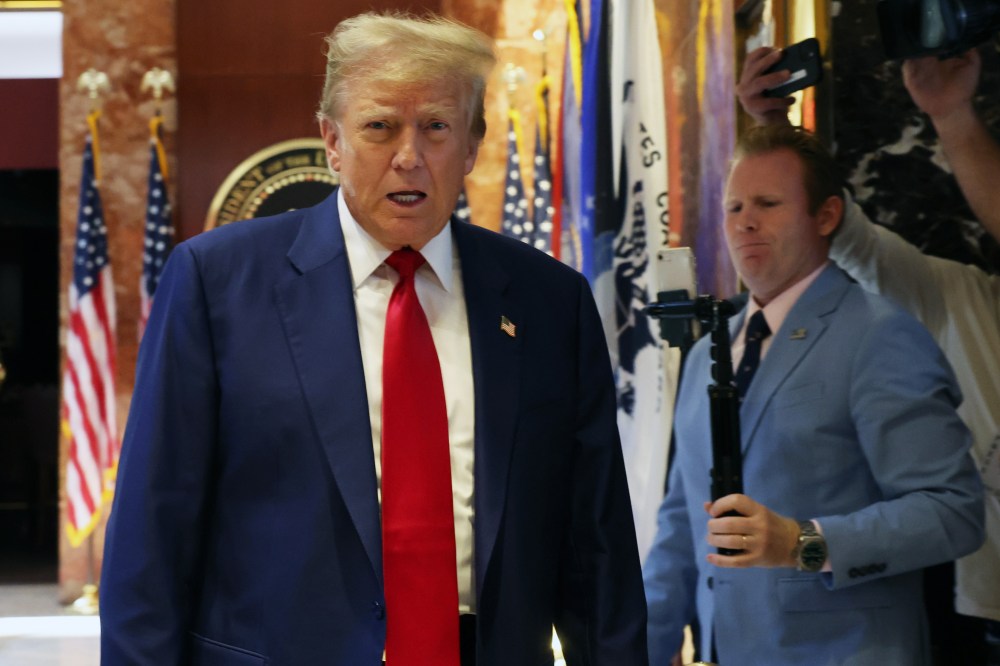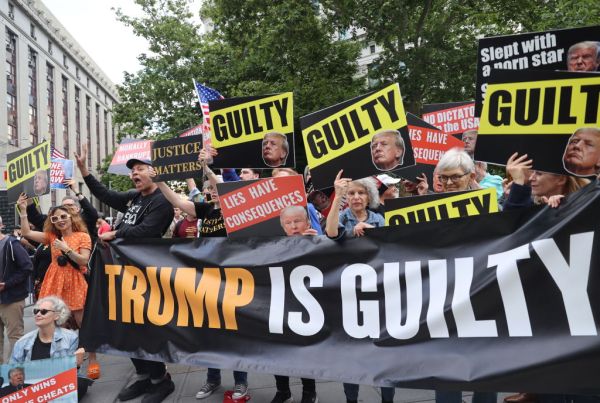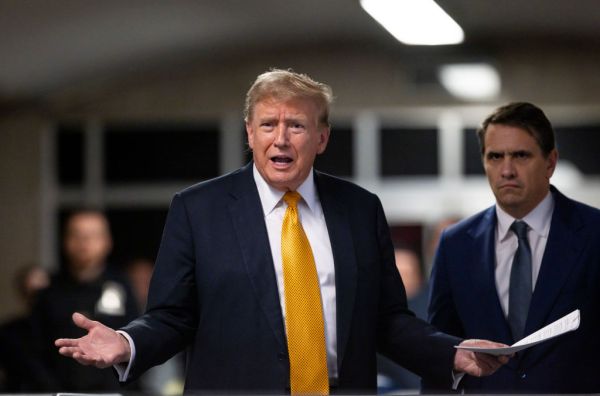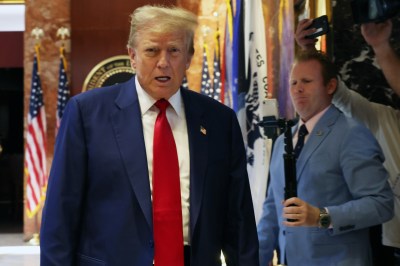Welcome to a special, post-verdict edition of The Collision, as promised. On Thursday, a jury of Donald Trump’s peers in Manhattan found him guilty on 34 felony counts of falsifying business records. This makes Trump the first former president to be convicted of a felony, and it could make him the first convicted felon to be elected president.
Hopefully, you’ve followed our coverage of the ins and outs of this trial, and there’s no need to rehash the arguments from the prosecution and the defense. But we know there are some burning questions out there about what happens next. We’ll dive right in and try to answer them as best we can, with this blanket caveat: There’s a lot that, at this point, is just unknowable.
What happens next?
Judge Juan Merchan has set a date for Trump’s sentencing: July 11, just four days before the Republican National Convention is set to begin in Milwaukee. Following the conviction, Merchan released Trump on his own recognizance, so he won’t need to return to court until the sentencing hearing.
What will Trump’s sentence be?
The maximum penalty for the crime Trump has been found guilty of is four years in prison and a fine of $5,000 per count, but it’s just that: a maximum penalty. Prosecutors will ask the judge for a sentence based on their assessment of the public interest and the defense will have the opportunity to respond. Judge Merchan has a reputation for giving out harsh sentences for white-collar crime, but he also will take into account Trump’s age, his lack of a criminal record, and the fact that there was not a victim in this case.
One lawyer who has looked into past convictions for this crime “found that roughly 1 in 10 people who have been convicted of falsifying business records are imprisoned and that those cases typically involved other crimes.” This has led many lawyers to conclude that a prison sentence is unlikely in this case.
If not prison, it’s possible Trump will be ordered to pay a fine, serve probation, or a combination of some or all of these penalties. But as of now, we simply don’t know.
Will Trump appeal the verdict?
Yes. There is no question that Trump will appeal and on a lot of different grounds. In no particular order, he could argue that the prosecution did not meet its burden as a matter of law, meaning prosecutors did not have enough evidence for a reasonable jury to find him guilty. He could argue that the judge made important errors during the course of the trial—for example, by letting Stormy Daniels provide lurid testimony that was more prejudicial than probative. He could argue that the jury instructions incorrectly stated the law to the jury. Most importantly, he could argue that the law itself violated his rights by allowing a jury to more or less convict him of an underlying federal campaign finance crime that he wasn’t charged with and that wasn’t actually a crime.
If Trump is sentenced to prison time, will he be free pending an appeal?
Most likely, Trump will remain free while his appeals are pending. For a nonviolent, first-time offender who isn’t a flight risk, a judge will likely grant the defense’s request to keep a convicted felon out of prison during the appeals process, which can be lengthy.
Can he still run for president?
Yep! The Constitution lays out the requirements to run for president: A candidate must be over the age of 35, a natural born citizen, not have been elected to the office twice. There’s nothing about having a clear criminal record. And, of course, Eugene Debs ran for president from federal prison in 1920 after being convicted of sedition for speaking out against American involvement in World War I.
Can he still vote for himself in November?
Under New York law, convicted felons who are not incarcerated can still register and vote. And under the laws of Florida, where Trump is a resident and registered to vote, a felon’s ability to vote is determined by the rules in the state in which they were convicted. So if Trump is behind bars on Election Day or during the early voting period in Florida, he won’t be able to vote. But given some important factors—including the possibility he will not be sentenced to prison time or that appeals could delay his incarceration—it seems likely that Trump will be able to vote for himself for president.
What other rights does Trump lose once he's convicted of a felony?
Some of this will depend on Trump’s sentence. According to the federal Gun Control Act, for instance, Trump would be ineligible to “ship, transport, receive, or possess firearms or ammunition” if he is “convicted in any court of a crime punishable by imprisonment for a term exceeding one year.” Additionally, in Florida, Trump will have certain civil rights, such as the ability to serve on a jury and to hold public office, suspended until after fulfilling his sentence. But wait—doesn’t that prohibit Trump from holding the office of president of the United States? No, as we laid out above, the Constitution is very clear about the requirements for holding that office, and the Constitution will supersede any state law in a matter like this.
What happens if he is sentenced to prison, then elected president?
This situation has obviously never occurred before. The clemency and pardon powers of the president don’t extend to state criminal proceedings. But Trump as president-elect would immediately file a petition in federal court arguing that the state of New York is interfering with Article II of the Constitution, which holds that he is to be sworn in as president and execute the powers of the presidency. To the extent being in prison interferes with those job responsibilities, he would argue that any remaining time left on his sentence would have to be suspended while he is president of the United States. This separation-of-powers logic would apply to the requirements of probation or parole as well.
How is the Trump campaign reacting to the conviction?
Trump himself gave brief remarks outside the courthouse following his conviction. “This was a rigged, disgraceful trial, but the real verdict is going to be November 5 by the people,” he said.
From there, the Trump campaign and its surrogates have been aggressively pushing for support and donations online under the banner of “Never Surrender.” And Trump also announced a press conference scheduled for 11 a.m. Friday at Trump Tower in New York.
What about Biden’s campaign? And the White House?
Here’s a statement released Thursday evening by Michael Tyler, the Biden campaign’s communications director, as obtained by our colleague David Drucker:
In New York today, we saw that no one is above the law.
Donald Trump has always mistakenly believed he would never face consequences for breaking the law for his own personal gain. But today’s verdict does not change the fact that the American people face a simple reality. There is still only one way to keep Donald Trump out of the Oval Office: at the ballot box. Convicted felon or not, Trump will be the Republican nominee for president.
The threat Trump poses to our democracy has never been greater. He is running an increasingly unhinged campaign of revenge and retribution, pledging to be a dictator “on day one” and calling for our Constitution to be “terminated” so he can regain and keep power. A second Trump term means chaos, ripping away Americans’ freedoms and fomenting political violence – and the American people will reject it this November.
The White House’s response was shorter: “We respect the rule of law, and have no additional comment,” said Ian Sams, a spokesman for the White House Counsel’s Office.








Please note that we at The Dispatch hold ourselves, our work, and our commenters to a higher standard than other places on the internet. We welcome comments that foster genuine debate or discussion—including comments critical of us or our work—but responses that include ad hominem attacks on fellow Dispatch members or are intended to stoke fear and anger may be moderated.
With your membership, you only have the ability to comment on The Morning Dispatch articles. Consider upgrading to join the conversation everywhere.